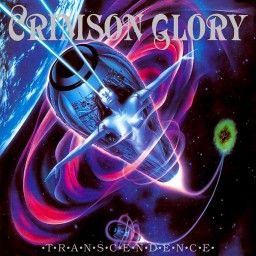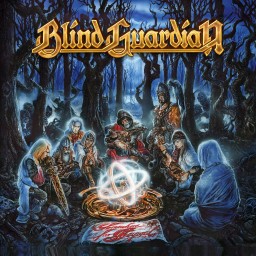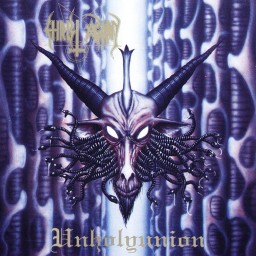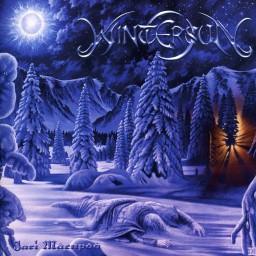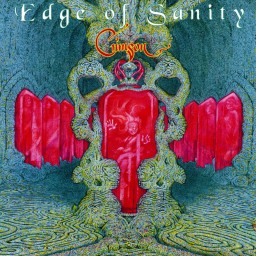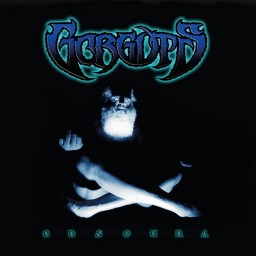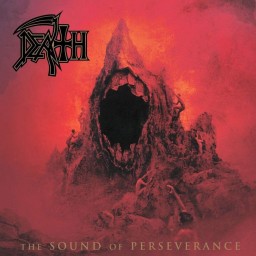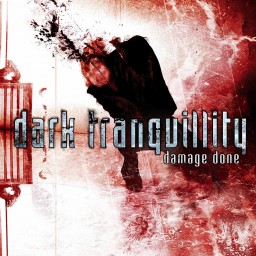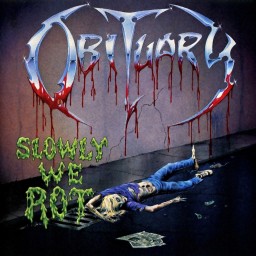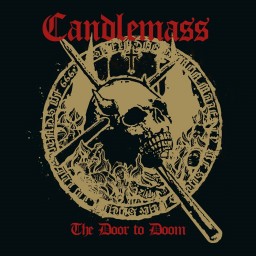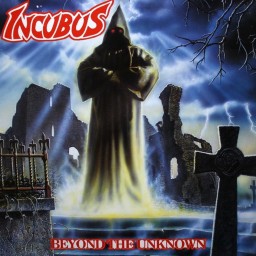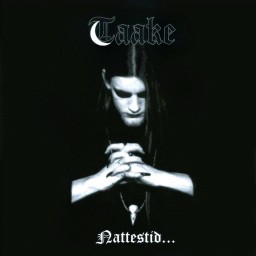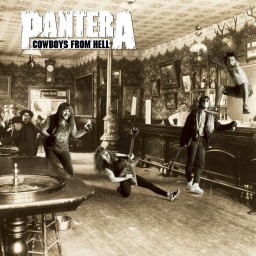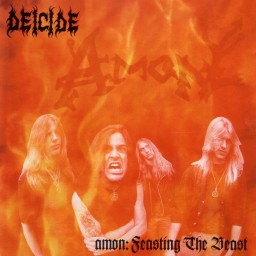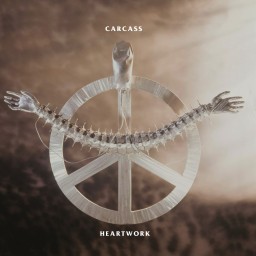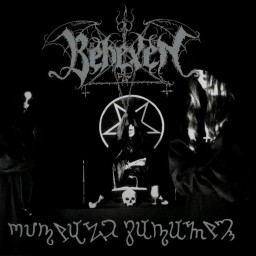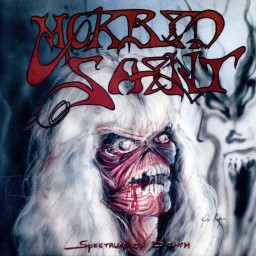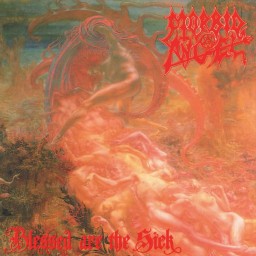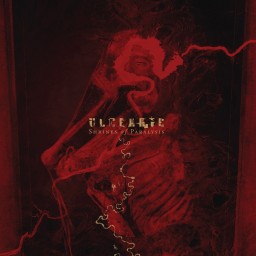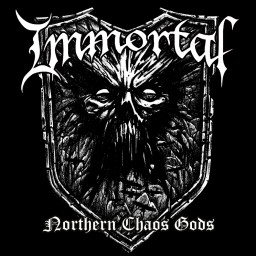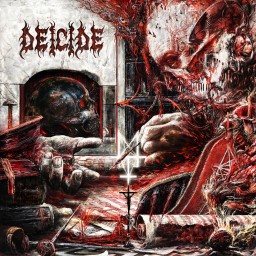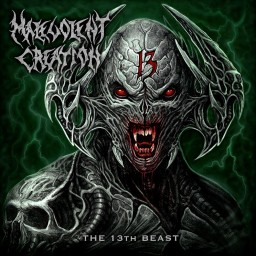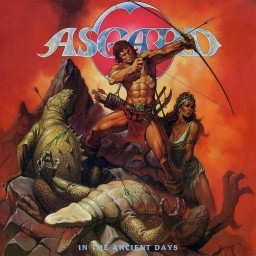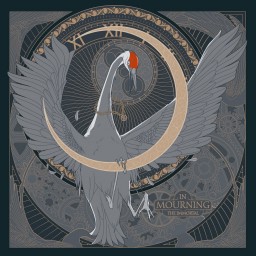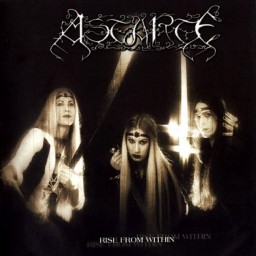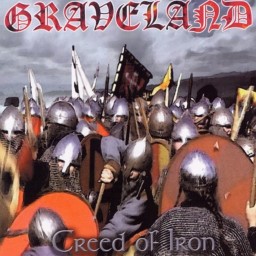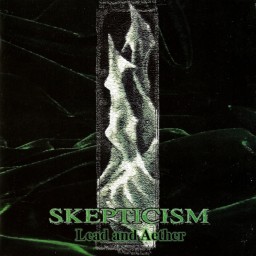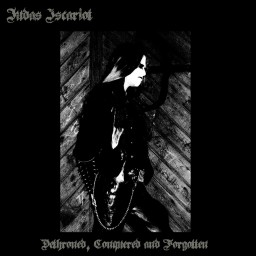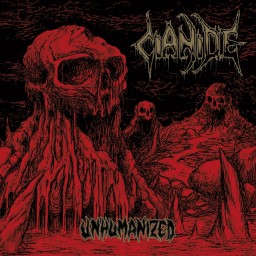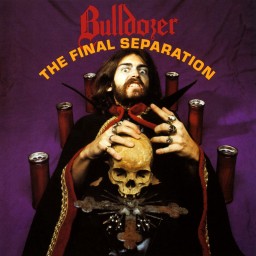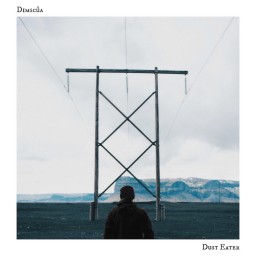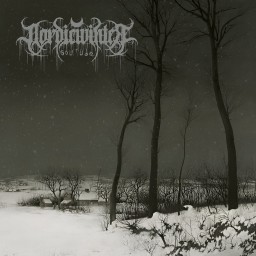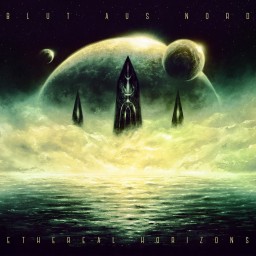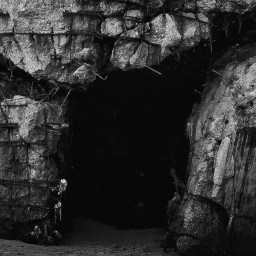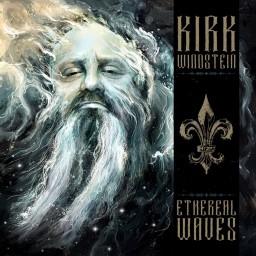Vinny's Reviews
The Progressive Heavy/Power Metal tag that seems to be attached to Crimson Glory is accurate enough in describing the sound on their sophomore release, Transendence. Coming two years after their well-received, self-titled debut, the band were already showing what mature and accomplished songwriters and artists they were in their own right. The depth of the quality on their 1988 release indicating that this band had fast become a force to be reckoned with a relatively short period of time. They had been around since 1979 though (as Pierced Arrow) and had changed their name after three years to Bewoulf before settling in 1983 on Crimson Glory. Famous for their silver masks (later becoming half-masks) the band was more than just performers though. Genuine talent sat in the ranks of the band, most notably with their vocalist, Midnight.
The late vocalist joined the band in 1983 and had bedded in well by the time they got round to recording their debut. His unique and challenging vocal style was an initial obstacle for these ears to overcome but once I understood their overall place in the arrangement of the tracks then it all fell perfectly into place. His vocal style fast became the unique identifier of the band's souund, backed up by the flair and skill of the rest of the band this all combined to become a formidable force. What Transcendence showed was that the building blocks of the debut had been used to construct a memorable and genuinely interesting record full of storytelling but never straying into the boundaries of bluster.
Guitarists Jon Denning and Ben Jackson are the other real standout performances on Transendence. The duo exchange licks throughout the ten tracks on the album keeping things energised and focused, delivering capable and consistent playing that maximises the entertainment value. From the opening track, Lady of Winter it is clear that this is not an experience the listener will forget very easily, the hooks are sunk in early on and are around for the duration of the record. The overall feeling of solidity is cemented by the drum work of Dana Burnell and bass musings of Jeff Lords. Both keep pace well with the overall development of the record and ensure that the whole experience feels like a real band effort.
For an album who's title espouses some existence beyond the physical form, there is a real sense of things feeling grounded and sensible without ever getting boring. The band sadly took on a more commercial sound after this release, leading to fractures in the band and the departure of Jackson and Burnell. The band never reached the proportion of brilliance they hit on this record again and sadly Midnight passed away in 2009 bringing down the curtain on a band that had so much promise but I feel peaked too early.
Genres: Heavy Metal
Format: Album
Year: 1988
I am quite particular about my power metal. I don't profess to be a big fan of it as a sub-genre by any means but I do know what I like and have found there to be a reasonably short list of preferred releases to revisit once I had gone through large amounts of pompous and overly grandiose nonsense to be honest. Blind Guardian actually are responsible for my favourite power metal album ever with their 1995 release Imaginations From The Otherside sitting top of my pile (well, more likely a slight bump) of such records. There are other releases that I have time for in their discography such as At The Edge of Time and Nightfall In Middle Earth which both have their moments but don't quite offer complete experiences.
Strangely enough I hadn't ventured much earlier than 1995 into their discography (given my general distaste for their latter day material, going back seems such a logical direction for me in terms of expansion of my knowledge and experience of the back-catalogue) so their 1992 effort, Somewhere Far Beyond was not familiar to me until this week. The first thing to mention sounds obvious to state, but this album is so very clearly a Blind Guardian record. Their trademark fluent and skillful musicianship shines through from the very start of the record along with their mastery of writing memorable and absorbing songs that take the listener on a journey.
The arrangement too is well calculated, structured to present a narrative of time travelling bards coming together to tell their stories as depicted on the grand and rather colourful artowrk that adorns the front cover of the release. As you move through the album track by track the dashes of brilliance that were to become virtually omnipresent on the follow up album leap out like sun flares, scorching the ether around the album, burning with the promise of what we know is to come in three years time.
As a result, despite these moments described above, the album doesn't feel complete. Perhaps if I had waited and listened to this record before Imaginations... I might have been more enamoured with it as a whole. In comparison it feels hindered somewhat and I find myself willing a bit more quality to ooze out of it that in reality was yet to be learned by this point in their careers. I found the 2007 remastered version to be entertaining enough still with the couple of demos/alternat versions of songs added on to the end. As a standalone album this is a great example of how Power Metal should be done, my messy timeline aside it probably does desrve a higher rating than the number of stars I have awarded.
Genres: Power Metal
Format: Album
Year: 1992
Blackened death/doom? Sort of like a more deathy Samael/Varathron-paced black metal album? It is hard to explain Christ Agony's sound to the layman as there are few like them in the world of metal, certainly around in 1993 anyways. For a (then) three piece they made a big noise, full of crunching riffs and spewing vocals. Granted it is lyrically naive but overall still offers something new and different nearly twenty years on.
What's that? Never heard of Christ Agony? Me neither until finding them here in the dusty archives of the "c" section under "Bands". Turns out they are Polish and have a lengthy career of some three decades (albeit on and off). Unholyunion was their debut after a couple of demo releases from 1990 onward and the band found a home on Carnage Records for their debut full-length.
Straight away something is different to your normal bm record. There's only four tracks, ranging from ten to fifteen minutes in duration and there's bone crunching riffs like on an Asphyx record. The pace varies as well so it is not all one-dimensional slow and laboured riffing, there's blast beats to contend with her also to liven things up. There's atmospheric passages to invoke a bit of drama and menace where necessary that give tracks some real sense of depth and density.
It is hard to get too lost in it though because it is only four tracks and the track lengths all could do with a trim and they lack enough variation for the track lengths to make them really interesting. The pace never gets down to blackened drone/doom/death proportions but the track lengths could have you think the prospect is there. Vocally it is a bit guilty of some immaturity with a couple of parts were the word "Satan" gets growled ever few bars or so and it just feels amateur even for 1993. Although not a bad record there was definitely room for improvement.
Genres: Black Metal
Format: Album
Year: 1993
Sigh!
For the first few seconds of the opening track of this album I was struggling to see how this had anything to do with Death Metal. Having heard only black metal style vocals over poppy guitar work, I am still no nearer if I am honest. The internet tells me that this is Symphonic Death Metal. I don't believe everything I read on the internet for a reason.
There's no power behind much of anything on display here and so I am left to hope that some catchy songwriting or sonic wizardry is awaiting me over the coming tracks. It isn't though! The tempo and structure suggests that this could be a folk metal album, except they forgot to write any actual folk parts to any of the tracks. As a result it just sounds like overtly jolly heavy metal with a black metal vocalist who has no friends who like black metal so he's had to join any band he can find.
If I am forcing myself to find any positives and not just look like a miserable bastard then I would say that the lead work is of actual note and clearly the work of an adept guitarist. The rest of I found a real struggle to get through with no spark or even palatable consistency to cling to I do confess to hitting the skip button more than once in search of something of interest.
The lyrics to track number three Sleeping Stars sum up the experience perfectly for me:
"Suddenly I feel a
warmth go through my body,
but I feel that a
part of me has died."
The "warmth" might have been wind though.
Genres: Death Metal Power Metal
Format: Album
Year: 2004
More than a little reminiscent of early Opeth, fellow Swedes Edge of Sanity where a late 80's/early 90's progressive death metal band. They released eight albums before finally calling it a day in 2003 (after previously doing so in 1999). As I have already alluded to, the likeness to the sound of their countrymen is hard to ignore. It is not that one band copied the other I suspect. Sweden just clearly had a plethora of talented progressive metal heads throughout the 90's and they couldn't possibly all fit into one band.
Crimson actually is one song album split into parts depending on what version you look at. A one song album in 1996 was a bold and brave move but the fact that Dan Swanö's name is on the liner notes should tell you all you need to know. As with most things he touches Crimson is ambitious to say the least but is backed up by deft playing and clever songwriting. The progression on here is well measured, tempered almost to maximise the enjoyment. Considering it is just one song the record never gets boring as it changes pace and tempo well during its expansion over forty minutes.
It requires a close ear to be given to it in order to truly appreciate the vast and intricate nature of the entire offering. But anytime spent with this record is time well spent. It will take you through death, progressive and at times gothic elements of metal and blend all of the styles together with a real deftness. To date it is the only release from the band that I have sought out to listen to and such is my satisfaction with it I have not yet felt the need to venture further into their back catalogue. I really can't recommend this enough.
Genres: Death Metal Progressive Metal
Format: Album
Year: 1996
Enter the avant-garde, bass twanging, bone-jarring branch of Gorguts that seems to cause equal amounts of praise and revulsion across the death metal fan base. I sit firmly in the praise camp. Not that I don't get the challenges that people have with this directional shift from the bands previous releases (all respectable enough DM records), but for me what impresses me the most about Obscura is the sheer range and scope of the album. It isn't perfect by any means but, as per my love of Colored Sands this record likewise retains death metal as its core source, despite the multi-layered influences on display here Obscura does still come across as a raging death metal record full of energy and rampant angst.
Lemay's trademark demented shriek accompanies the instrumentation perfectly. I find the music twists and contorts perfectly throughout, taking the listener on a real journey. The only real downside to that journey perhaps is the length of it. Clocking in at an hour in duration, the record does meander a bit unfortunately. Although it is stylistically refreshing it is not controlled enough in its delivery to be able to sustain a presence for such a long period of time. To compare it with the aforementioned Colored Sands is a fair contrast really as the latter album absolutely nails the delivery of the avant-garde/experimental aspect by integrating it into the overall sound better, even though the run time is more or less the same the 2013 album feels more palatable.
From reading the criticism of Obscura there's definitely a feeling of the album being something that is done to the fans as opposed to being something they feel is introduced to them. As full on as it is, the record is still fun and an entertaining enough curved ball.
Genres: Avant-Garde Metal Death Metal
Format: Album
Year: 1998
Albums grow on you for different reasons. As an avid fan of most of Death's earlier releases I didn't find the same levels of entertainment in much of anything after Spiritual Healing. Whilst I could more than see the talent and skill involved in the direction that Chuck was taking Death's sound, progressive elements of metal have only recently become of interest to me - over the last 12 months say - so for a number of years the majority of the bands later releases gathered some dust on my shelves. I now find myself oddly in the reverse mindset where I prefer the later output to the initial three releases. For me The Sound of Perseverance is the crowning glory in this more progressive style of death metal, largely because the whole thing just feels so natural and effortless.
Oddly for death metal, there are lots of feel good vibes for me on this record. The chords sound more open but the riffs are just as cutting as you would expect from one of the founding fathers of death metal. Whilst obvious, the time changes are not intrusive and feel clean and polished. Again these are traits i would not attribute to me gleaning enjoyment from in terms of my more extreme tastes but they work so well with the confidence and aptitude of Schuldiner, Hamm, Clendenin and Christy.
The band sound like they enjoyed making the record, such is the warm feel to proceedings. They almost tease the listener during Story To Tell, with their stop/start playing leaving you wondering if the track is over or whether another time change is due. There's an accessibility to proceedings that is reminiscent of almost rock music proportions, only Chuck's grim vocals and the chugging riff passages keep you of the understanding this is still a death metal record at its core. The creepy atmospheric bass and guitar interlude during Flesh and The Power it Holds also adds the necessary levels of menace you'd expect.
In terms of criticisms (what is keeping that half star off the score) I have two. Firstly, the cover of Priest's Painkiller is both out of place in the greater context of the album and also not a very good cover either. Secondly, the album is a tad too long with the cover on here. In terms of flow it is all mapped out superbly as an album but it just falls at the end unfortunately.
Genres: Death Metal Progressive Metal
Format: Album
Year: 1998
My melodic death metal tastes aren't really that wide in scope as I tend to dwell in the more extreme end of my tastes in death metal generally. Without wishing to generalise too much I find most bands that fall under this sub-genre to be underwhelming. Why would I want my death metal to be melodic, ergo more accessible is the question that has remained largely unanswered for the past 30 or so years of listening to metal. Dark Tranquillity were still a new band for me until today, but sadly they have brought little in the way of reasoning for my opinion of the melodic side of death metal to change much.
I mean it is very melodic, don't get me wrong. There's keyboards galore on display as well as melodious guitar parts, but none of it sticks with me. The riffs feel aggressive enough but they don't really set anything on fire for me and so come off as being restrained or blunted somehow. Stanne's vocals aren't awful by any means but just come across to my ears as being very generic ad tired sounding.
The album seems to go on and on as a result of my struggles it seems with only really track twelve standing out as the album closes with it's adept instrumentation bringing a memorable ending to proceedings. Again, I don't report that the band are doing anything wrong here, I know that the issue lies more so with me than anything they are trying to achieve. To a convert of the melodic death metal sound it probably will have more stars against it's name. I however struggle to give much of anything to the release.
Genres: Death Metal
Format: Album
Year: 2002
As intros to death metal go, mine wasn’t too shabby. I bought “Slowly We Rot” blind, in the days of (me) having no internet and just a sick logo and equally sick artwork to tickle my pubescent fancy! I had never even heard any death metal at that point but I instantly loved every fucking minute of this record.
I had to play it at my grandparents house and luckily my grandad had a great stereo set up. When he first heard the record he thought he had something wrong with his equipment. I had to convince him for a good few minutes that it was supposed to sound like that.
I was instantly enthralled by Tardy’s vocal style and remember thinking how insane it was that a human could make such a noise. It was like a dumped high school girl puking and sobbing her hatred for boys out with only the occasional word actually audible through all the hatred and vitriol.
The atmosphere on the record scared the shite out of me, like some soundtrack to some mind-bending horror film. The record plays like a writhing, shifting mass of fetid, acrid evil just toying with the listener and taking great pleasure in doing so. The riffs on here are fucking scathing too so any flesh left on your bones from the Tardy onslaught is soon detached once the riffs kick in. Peres and West made a great partnership, leaving as much of an impact with their six strings as Tardy did with his vocal chords.
Although end to end this is a thoroughly ferocious affair it does lose me sometimes, not necessarily out of complexity more out of if sounding a little samey in places. Still though this is a benchmark Death Metal album for me based on both nostalgia and the overall genre impact it had.
Regrettably I sold my vinyl copy of this record and now don’t even have it on stream but I can still recall every track and every terrifying Tardy howl.
Genres: Death Metal
Format: Album
Year: 1989
Candlemass 2019 are epic. I mean in terms of the sound at least. This plays more like an epic heavy metal record as opposed to a doom record. Yeah, the heavy drudging riffs are still there but there's a real sense sword-wielding, bicep popping warriors flanked by women in metal underwear sat on spiky horses type fantasy. Opening track "Splendor Demon Majesty" is an unashamedly dark opener full of occult promise that pulls of a perfect balance of menacing worship of evil deities whilst also pacing superbly to open the album strongly. Even the most doomy tracks here are still laden with such vocal stylings. "Astorolus - the Great Octopus" (great fucking song title) is an obvious choice here, even given Iommi's input it still doesn't stray to far away from the epic nature the song title and feels well balanced. It rumbles and rolls like a great Octopus would do assisted by some superb lead work along the way that stab through the menacing atmosphere. Likewise, the gallop of "Death's Wheel" drops down in pace to doomy depths for the chorus to become one of the nearest experiences to the 1986 debut heard on here.
Let's be honest though folks, this isn't "Epicus..." part two. Not that anyone really wanted that though, right? On its own, "The Door to Doom" stands up as a fantastic record for a band who haven't released anything notable since "Tales of Creation". It is not that recognisable as a Candlemass record though which will no doubt get the diehards moaning into their retro flares and skull effect candlestick holders whilst crying into their earthen drinking vessels full of mead. The only real reminders on here of the doom relationship is the fact that the record on the whole reminds me of a much better version of "13". As I sit listening to "Black Trinity" I hear so much similarity to numerous tracks from Sabbath's last full length that I had to look twice in the instrumental parts to make sure I didn't the library on shuffle.
That withstanding, "House of Doom" is a superb doomy romp with monumental riffage and pace and horror themed synths to build the atmosphere to boot. This was on the the EP of the same name from last year and is probably may favourite track on here certainly in terms of its authenticity to the Candlemass sound of old, chiming church bells ringing to fade as the track closes. If anything the record gets doomier the final 2 tracks. Check out the riffs on "The Omega Circle" if you still need your bed wetting from some punishing doom metal before the band signs off on a job well done.
There is only really two criticisms I can level at the record, one being the utterly pointless filler of "Bridge of the Blind", a crap ballad dropped in after just 3 tracks of excellence is just out of place both in terms of the timing of its placement and the marked difference in pace from the rest of the album. Secondly, too many tracks start the same way. There's about 3 or 4 that start with some slow picked strings and Languist crooning as an introduction to the tracks proper. It just gets old after the second or third time even though on each occasion the track is soon hit by an epic riff or stomping pace change,
Sadly, if it wasn't for the shit ballad this album would have afforded a higher rating as it makes very few bad steps along it's length. Buy it for the love of metal though, not just because it's Candlemass.
Genres: Doom Metal
Format: Album
Year: 2019
Death/Thrash or Thrash/Death? Does it really matter? Whichever style you believe has most traction in the calculated attack of Opprobrium (known as Incubus to the older audience), it certainly makes for an authentic and entertaining listen. For me the Thrash elements act like explosions of flavour, giving notes of energetic bitterness. The menacing death metal atmospheric dirge is still the more prominent factor in the sound but both elements are akin to some acceptable collaboration between the genres with neither one ever truly outweighing or outdoing the other. Like two warring factions have decided to call it quits and just try and get along as best they can!
The authenticity comes from that sound on the production that gives the impression that this was recorded in someone’s garage, yet the quality of the songwriting leaves the listener with structures that suggest it may have been planned in the office of an architect.
This is the kind of album that makes a consistent entry on thousands of music blogs about “Underrated/Unsung Classics” from the 90s. And the majority of those bloggers are right. There’s nothing here that is any dramatic step down from the nefarious and menacing death/thrash of “Seven Churches”. “Beyond...”punches well within its category but never quite reaches the furious delivery of Demoltion Hammer. The latter just works hard on the jab whilst “Beyond...” has a more varied sack of sucker punches that strike from behind its darker guard.
At just eight tracks, the sophomore release from these guys feels like a real clear cut, transparent statement of intent. Turn up, put it down and get it out there, and it is this immediacy of the record that really appeals. The band name may have changed but this album remains exactly as good as I remember it first time of listening.
Genres: Death Metal Thrash Metal
Format: Album
Year: 1990
The debut full-length from Taake came at the arse-end of the second wave era of BM. By 1999 nobody was burning churches anymore, bands weren't killing each other's members and many stalwarts of the genre had already drifted to a more experimental sound. The success of 'Nattestid...' at first glance seems surprising, yet a couple of listens unearths an album built on a foundation of solid songwriting, supported by razor sharp steel riffage and decorated with a consistent theme permeated by some subtle yet lasting nuances to maintain its hellish Feng Shui.
For all the cold and scathing guitar here there's more than a fair share of melody, whether that is rooted in the viking style passages or just the more obvious folk leanings of the album. Whenever it is there, it seems effortlessly measured. It never takes the edge off the raw energy of the tremolo and nor does the cutting of the riffs blunt the impact of the more melodious elements. Throughout the album the bass and drums maintain a strong presence (especially on instrumental track, 'Vid IV ') and Hoest himself, shrieks and rasps along like some demented high priest undertaking some satanic and nefarious ritual. There is an edge to the guitar throughout more or less the entire record that sounds a little too hazy at times which I can only put down to the production job (yes I know it is a BM album, but nonetheless it remains my only gripe).
It is easy to see from the seven tracks on show here that Hoest's talent for accomplished and consummate songwriting was already well developed at this early stage of his career. Frostein's deft contributions on both drums and bass make these visions whole. Considering the two man line up it is an album that has a vastness in scope that belies the small number of contributors.
The menacing and creepy looking artwork on the album sums up the nightmarish soundscape inside perfectly. The minimal approach to the tracklisting earns kvlt/troo points by the bucket load.
Genres: Black Metal
Format: Album
Year: 1999
A shuffle playlist in my hotel room this past week threw up 'Heresy' from this record and I have ended up playing the whole record through in my head before getting home and playing the CD. In the 90's this record occupied a near constant place in the top 4 of my 'most played', alongside 'Painkiller', 'Arise' and 'Seasons in the Abyss' it got span to death over nearly the whole decade. There was so much that appealed to my established taste at the time yet also equal amounts of new and enticing sounds to absorb, all delivered with a fervour and ferocity that was literally breathtaking. In so many ways, playing this for the first time was like listening to something that was nothing like anything I had heard before, yet at the same time there was enough reference points to breed the necessary amount of familiarity for me to engage with it instantly.
Although this does not retain the top slot in my favourite Pantera list, it holds enough nostalgia and tangible feelings still of the initial awe of the discovery to always have an important place in my evolution through the genre.
There has always been a real sense of cohesion to me about the sound of Pantera. They are like some well oiled machine with just enough AI in it's computer parts to deliver flare and panache instead of just routinely processing the same parts over and over again. Whether it is the shrill wailing of Anselmo, the chunky stick work of Vinnie, the rumbling current of Brown or the insane string wizardry of Dimebag you focus on, they are all there together as a unit. Yes, for me the overarching memory post-listen is those fucking riffs, but the structures they form part of are also key to their impact.
I enjoy the darker side of the album's sound. 'Medicine Man', 'Message in Blood' and 'The Sleep' stand out as a trio of tracks that add a real depth to an album that given its relentless approach could otherwise lose you towards the end. Pantera seem to "grow" with the progress of the record which is rare in most releases that have frequented my headphones since the 90s.
Does it stand up well as a singular release some 29 years later? Not quite for me, even with the memories these 12 tracks hold for me I can't avoid the need for a couple of tracks to be trimmed ('Heresy' and 'Shattered') to really cement five stars in the rating for this review.
Genres: Groove Metal
Format: Album
Year: 1990
I am not a fan of compilations generally. I usually see them as opportunistic releases designed to boost the coffers of the associated record company who have been fortunate enough to scoop the demo recordings or greatest hits rights to a band's back catalogue. That withstanding, 'Amon: Feasting The Beast' actually has relevance beyond appealing to just the avid uber-fan of Deicide. It is a release that showcases the raw talent, energy and commitment of the band before they became the death metal household name we all recognise to be Deicide.
There's still some turkeys on here, the second attempt at 'Sacrificial Suicide' sounds like Benton has a lisp and is just ridiculous, for example. However, as a release of a piece of death metal history, 'Amon...' stands up well enough. It is hard to get too excited by it, likewise difficult to extend paragraphs enough to stretch to a full review of the release.
Genres: Death Metal
Format: Compilation
Year: 1993
There are very few albums nowadays that I can recall track by track in my head. The fact that ‘Heartwork’ still plays through my memory some 26 years after I first heard it is testimony to it being a big part of my metal journey and also the catchy nature of the songwriting. I get that it is a departure from previous direction and that for many it was a step too far away from the more familiar sound of the band, but “Heartwork” was still a strong metal record and still recognisable as Carcass regardless.
My rating of 3.5 stars really only reflect my transition towards their earlier material as I have aged. “Heartwork” gets less rotation than “Symphonies...” or “Reek...” do, but at the same time will always have that element of nostalgia present to give it a solid rating. Whether it is the energetic start to the title track or the chop n chug of “No Love Lost” or even the spiralling maelstrom of “This Mortal Coil”, there’s still variety on this record.
As a melodic death metal album this just about has enough edge still to cut the mustard with my more extreme tastes. Often it gets criticised almost as an album that let the band down in some way, but I don’t think that is fair as it still stands up as a successful turn of direction for Carcass as well as being a defining record for the melodic death metal movement.
Genres: Death Metal
Format: Album
Year: 1993
'Rituale Satanum' stands up as a glorious exploration of how true aggression can be ported onto an audible format with pure aplomb and genuine heartfelt hatred. Some of the riffs on show here are truly demonic and when coupled with those rasping and harsh vocals make for great effect on one of BM's most under-rated releases. The melodic elements whilst not always as obvious to the ear are there in the background like some dark, melancholic tidal current that churns up sightless, shrieking beasts in it's waves.
From the menacing spoken word to 'Intro (The Summoning)' we are instantly into the scathing guitar that opens 'Sota valon jumalaa vastaan" which straight up lashes away at the listener for its entire duration. 'Night of the Blasphemy', whilst no less intense in the delivery, offers that melodic element to give additional structure to the chaotic riffing and blasting. 'Christ Forever Die' with its more measured approach to the track offers a well-paced build to the track whilst losing none of the looming threat built so far over the first three tracks. The hatred and vitriol for the icon of the subject matter from the track title is obvious as ever in the vocals here. They act like some scorching wind that you could envisage peeling the flesh from the face of the holy one just by virtue of the wickedness behind them, spat like acid onto the face of the crucified man. I find that the instrumentation and arrangement of the song actual temper the vocals really well also.
One of the real successes of 'Rituale Satanum' is that whilst it remains unrelenting in delivery it never feels like a drain to listen to in one sitting. Rampant BM records like 'Battles in the North' or 'Pure Holocaust' do lose me at times despite my enjoyment of them. I think the unexpected moments such as the lead work on 'Towards the Father' keep things interesting and challenging without showing any dip in the fury on display.
The big build up to 'Saatanan varjon synkkyydessä' feels like the start of some epic heavy metal track but soon becomes that familiar slaughtering paced frenzy, yet there's great structure to pace the track out to retain some of the majesty built in the intro to the song, to bridge the chaos in between solid start and finish sections and add a funereal set of keys to finish.
My favourite track on the album is 'Baphomet's Call', it has an almost easy feel to how it drops around some light riffing into an almost foot tapping pace. It plays like some old rock track given the Satanic treatment with it's death metal like layered growls midway through. 'The Flames of the Blasphemer' is just as harsh as the track title indicates but again makes great use of melody to manage the flow of the track. There's also an almost NWOBHM feel to the pace here as well, although the return of the funereal keys soon stamps sufficient atmosphere on proceedings to remind me that this ain't no Diamond Head record.
The final two tracks work superbly to give a almost grandiose ritual(e) feel to the closing part of the record. The solid drumming of 'Blessed Be the Darkness' and demented shrieks of the vocals that share space with spoken word recitals midway through the track weigh a dense atmosphere to proceedings. By the time we get through the closing (and title) track with its slow pace there's a real sense of finality and closure, like as a listener we have been through some torrid and yet positively memorable experience.
Genres: Black Metal
Format: Album
Year: 2000
If you have been paying attention to my musings in The Pit Clan Challenge then you won't be surprised to find that I have given this record four stars. It characterises that rabid and vicious thrash metal that I enjoy so much and only the fact that some of the production work on this is truly terrible (as in beyond being able to simply be considered kvlt or cool) then a full five stars would have been easily awarded.
For sheer lack of fucks given the album scores about a ten at least, this is a record forged out of complete abandon of compromise. It starts off relentlessly and ends up the same without once letting up. Every aspect to it feels bestial and evil in the most primitive sense. Whether it is the menacing vocals with their sneer of derision and mocking undertone, the bashing fury of those drums or even the manic strumming of the bass underneath the charging dual guitar attack, it all has a fee for antediluvian values throughout.
Considering the band started out some six years before recording this by just playing Priest, Maiden, Sabbath and Crüe covers, what they eventually got to transcribe to record was far removed from their covers days. This is crude and unrefined music for ears of fans who genuinely don't care too much for compositional excellence or song writing prowess. Each track has one intention, to rip your fucking face off! And they do it, eight times in a row.
As I mention above, the main issue here is the production job sounds terrible. Notwithstanding the fact that it kind of suits the ideal in so many ways it is too obvious even for my extreme metal scarred ears for me not to notice. Instead of charging the energy in the record it kind of blunts it a little bit although I still get multiple lacerations after each spin of this record.
Genres: Thrash Metal
Format: Album
Year: 1990
Blessed Are The Sick" is still as relevant now as it was 20 + years ago, with its sonic wizardry, beefed up guitar sound (when compared with its predecessor at least) and the furious thunder of Sandoval on the drum kit driving forward this beast of a record. The complimentary lead work of Richard and Trey (Richard and his more melodic moments to temper Trey with his swarming, chaotic and sonic shredding) works superbly and you get a real sense that this is band much improved ability wise from their previous outing.
The maturity is evident and the whole package has a more serious edge to it with the album artwork grotesque and twisted like the sound of the considerably darker music within. The intro is a perfect opener with the almost engine like noise of some hellish machine made from crying children and grinding bones being revved up to floor the accelerator and destroy all in its path. By the time it gives way to opener proper "Fall From Grace" you are sat bolt upright waiting for the assault to happen and your are not going to be disappointed as the track smothers you in glorious low end marauding DM.
The build up to the title track is varied with each track managing to stand out as individual points of brilliance. The fury of "Brainstorm", the sudden slowed technique of "Rebel Lands", the horror film soundtrack keys of "Doomsday Celebration" and the frantic pace of "Day Of Suffering" all cement the foundations of the stairway up to "Blessed Are The Sick/Leading The Rats". The title track is a slower but epic descent into the bowels of Hades themselves the bottom end of every note pulling you further down into the darkness before the flutey ending adds a bestial cherry to the top of the hellish cup cake!
The title track acts a central pin for the whole record, it is not that this is the peak of the album as what follows it is just as intense and powerful as the rest of the album so far, but the title track does exactly what it is supposed to. It is the pillar running through the atmosphere, direction and experience of the whole album. This brings me on to the structure of the album as a whole, the already mentioned intro starts things off perfectly but the changes of pace are brilliantly scheduled, the haunting beauty of "Desolate Ways" with its picked acoustic strings is like a beautiful woman with an underlying darkness lay in field of scarred and twisted corpses and it stays with you long after the album has finished. "In Remembrance" is the perfect ending to the album, an acknowledgement that although the chaos is over things won't be the same again as a result of it.
Genres: Death Metal
Format: Album
Year: 1991
It is hard to quite put into words the monstrous fury of Ulcerate. The difficulty largely lies in the fact that for every bludgeoning riff, hammer blow drum hit or swirling wall of noise that the New Zealanders strike the listener with, there's a remarkable amount of deftness and skill in the calculations they invoke to deliver their assault.
There were times when I listened to "Vermis" (the predecessor to "Shrines..." for the uneducated reader) and that precision was off, albeit very minutely. The vocals for example on the bands 2013 opus felt some how lost in the mix and at times there was a sense of not actually being aware whether they had begun or not. They are some of course who thought this a clever use of the mixing desk to create that folly deliberately, but for me the storm of Ulcerate's sound needed that extra bit of definition vocally to turn a great album into an absolute classic.
Thankfully, here on the band's fifth full length offering, the vocals are prominent and whether you deem them visceral or based on intellect they are very much a centre piece of "Shrines Of Paralysis". Yeah, there's occasion when they do go under the churn of riffs, drums and bass but thankfully these are rare and do not distract.
As well as Paul Kelland's lyrical exploits being a point of particular note, the listener cannot miss the frankly fucking amazing performance of Jamie Saint Merat on the drums. They are powerful, punishing and utterly fucking relentless. The clever bit being that every other instrument is allowed to breath around them without any one detracting from the other. In a tornado of sound like the brand that Ulcerate stir up to say you can pick out the bass is testimony to their technical excellence at not just performance but at actual songwriting also.
Hoggard's riffs are of course merciless too. They are like being stabbed by a surgeon, with each slash designed to incapacitate whilst also make you nod in complete appreciation. There's geologists probably queueing up to take abrasivity tests on Ulcerate's riffs and they know the scores will be off the motherfucking chart.
Things get off to an explosive start with opening track "Abrogation" as it bursts out of the speakers like a soul of hell clawing for freedom from the burning fury of Hades itself. As "Yield To Naught" continues in much the same vein it is here I first start to note the clever use of melodic components of the tracks. These are there most of the time but instead of being drowned out by the thunderous roar of the band in full throttle, they are more marshalled by the riffs and percussion as if being constantly reminded of their place even though they are key still amongst all that is going on. Throughout the pulverising violence of the bodily harm inflicted you are never far from an atonal stab or dissonant tranquility as they bob atop the tide of the endless churn.
To have all that going on must require an almost military precision as never does anything seem confused or chaotic. Even at their most furious Ulcerate show clarity of structure and planning. The title track with its progressive build and eventual unleashing of all living fury proves this point perfectly.
One thing that is obvious throughout is the layering of the experience. "Extinguished Light" is like unwrapping a gift and finding exploding candy in each layer, each variety giving a different flavour and texture experience to the last.
To sum up "Shrines Of Paralysis", it is like an in depth documentary on the mechanics of Technical DM. As well as exploring the intense fury of emotions involved, it takes opportunity to delve into the skillset required, demonstrating along the way a work of real dark art done by true masters of the genre.
Last time Ulcerate and Gorguts released an album in the same year was 2013 and they both blew me the fuck away, with "Colored Sands" edging "Vermis". In 2016 they've reversed it for me. "Shrines Of Paralysis" is nowhere near as dense as "Pleiade's Dust" in content and style but it takes the raw emotion of the genre and hones it into an explosive, purposeful and memorable DM experience.
Genres: Death Metal
Format: Album
Year: 2016
Behind every great man, there's a great woman. Behind every camped up, shape throwing, garrulous Black Metal vocalist there's a great song writer. Both of these statements are true, except the second one actually does not commend Abbath as being the imaginative, creative and artistic driving force behind Immortal. This is blatantly obvious if you have heard his solo pop/rock record of a couple of years ago.
What "Northern Chaos Gods" does is essentially pull off one of the best tattoo removal jobs in the history of "I Love Sharon" ink stains on most truck drivers (married to a woman called Rose) arm's being obliterated by lasers. Despite a big character no longer being present on this record, I don't for one second miss Abbath. Demonaz and co manage to put out an album that sounds so much like Immortal of old you could be forgiven for crying "Fake News!" at every mention of the turmoil and split between the founding members given the music is as strong as it has been in some while.
Demonaz even sounds like a more in control albeit slightly more subdued Abbath. But it isn't the vocals that will get you sweating like a blind lesbian in a fishmongers. Nope, IT'S THE FUCKING RIFFS MAN!!!!!! It is genuinely like getting twatted by an octopus for 42 and a bit minutes, listening to this record. Utterly relentless in their delivery, Immortal just pummel away at you, occasionally throwing an atmosphere building intro before thundering off on hoofed steed to epic landscapes such as "Where Mountains Rise".
There's no Judas Priest or Iron Maiden esque dip in output here in the absence of their established frontman here. Demonaz and Horgh have - to put it in layman's terms - just picked up and ran with the established format. Don't get me wrong, it isn't anywhere near the quality of "At The Heart of Winter", although it does piss all over "All Shall Fall". Think of it as being the record "Damned In Black" could have been as a better precursor to the great "Sons of Northern Darkness".
They have a song called "Blacker of Worlds"!!! I mean what grown man with the mind of a pubescent boy doesn't think that is cool as fuck??? If the start of closing track "Mighty Ravendark" doesn't bring you out in goose pimples, you're dead inside. Fist pumping, neck snapping metal right here folks.
Genres: Black Metal
Format: Album
Year: 2018
Glen Benton is 51. Fuck I feel old now too. Deicide are 30 years old (32 if we count the Amon era). Album number 12 from the fathers of Florida death metal is a strong effort considering yet another change of personnel has occurred. It is bye-bye Jack Owen, hello Mark English of Monstrosity fame taking up guitar duties and ironically I like "Overtures of Blasphemy " a lot more than Monstrosity's effort this year.
Whilst it can never make the "beast of a DM record" title I would give to the debut or"Legion" for example, "Overtures..." is entertaining. Whether it is the melo-death passages that litter the streets and alleyways of this record or the more familiar sacrilegious blasting fury of Deicide at their (old) best, there's plenty to balance the experience over these 12 tracks. Take "Seal The Tomb" for example, it goes immediately for the jugular, relentlessly chugging riffs alongside Benton's usual demented growls only to be tempered by menacing and interesting leads and sonics that carry the song along well. Listen once to this track and it is in your head for literally days after.
Then there's the vehemence of the lyrics of "Compliments of Christ" were you can feel the spittle from Glen's lips splattering your ears as he spews forth the vitriol he is best known for. "Anointed in Blood" opens like a lead jam session recorded mid flow before developing into a hellish gallop of fiery hooves, again perfectly completed by some well placed and well timed leads.
This is were Morbid Angel went wrong with "Kingdoms..." safe DM with little if any attention paid to the sonic wizardry of their sound. Take a leaf out of Glen's book Trey!
It is clear that this is no nonsense DM that still has enough equal measure of extremity and assured and unapologetic attitude to hold it's own against most of the DM records released this year. It is not perfect by any means. I lose it on more than one occasion if I am honest ("Crucified Soul of Salvation" in particular hits my 'standby' button really nicely) and it is a couple of tracks too long making for an almost excessive feel to the running time. Whilst it is a well paced record there's definitely some "filler" present. But for any turkeys in here there is still thankfully the brilliance of tracks like "Consumed by Hatred" to snap you back to attention. "Flesh, Power, Dominion" is one of the strongest things Deicide have ever put to tape btw.
Genres: Death Metal
Format: Album
Year: 2018
There's life in the old dog yet it seems. In terms of original members only Phil Fasciana remains in the ranks of Malevolent Creation now and after the passing of Brett Hoffman last year you could almost forgive fans for thinking the curtain had fallen on Malevolent Creation. The fact is that whilst "The 13th Beast" reinvents no wheels it does exhibit the sound of a band in the throes of something of a regeneration phase. There's nothing tired sounding here, no dull interludes to build unnecessary atmosphere. As soon as the spoken word intro to "End the Torture" finishes it is straight up thrashing death metal until the very end, some 11 tracks later.
Although all debuting in the Malevolent full length stakes here, the 3 musicians that join Fasciana on this record are all clearly capable and qualified purveyors of their art form. Again, I highlight that this is not far above your average DM record yet it is so assured and solid you can easily forgive it to some degree. Lee Wollenschlaeger gives a good acquittal of himself as an established and competent vocalist, filling Hoffman's shoes nicely. Phil Cancilla is a machine on those skins, blasting his way across the soundscape yet also using the percussion well when the occasional let up in the pace permits. Fasciana and Wollenschlaeger work well together to keep the chug of the riffs motoring along whilst Gibbs plonks, twangs and rumbles his way through every track, allowed to be heard in the mix and show his variety without ever showboating. For a band together for only 2 years as a four piece they sound tight and committed.
There's no metal fan worth the denim their patches are sewn onto that doesn't look at that album cover and mouth a "fuck me, dude!" I mean, come on, it is fucking awesome. Like a more ornamental Predator head on a ghostly green background. I love it when album covers are matched by the content of the record inside, and whilst there are obviously some shortfalls here, still in the main "The 13th Beast" delivers. When they keep the track length short and succinct, Malevolent Creation are at their best. "The Beast Awakened", "Agony for the Chosen" and "Knife at Hand" all kick serious ass. By the same token "Born of Pain" at nearly 7 minutes long doesn't really do anything or go anywhere to justify the length attributed to it.
Overall, I would have preferred a shorter record. At 11 tracks the band cover a lot of ground in under 50 minutes but not all of it really needs treading. That withstanding, never does it get grating and still the accessibility factor remains consistent enough to forgive the extra excursions present.
Genres: Death Metal
Format: Album
Year: 2019
Despite a seemingly bottomless pit of a discography, I haven’t listened to all that many Thou releases in my time. It is possibly the case that Summit is my first listen through a full length release from them in fact. Subconsciously at least, I do tend to be wary of bands who constantly release material, acknowledging that whilst the tipping point may vary from band to band, eventually quality eventually is lost at the expense of quantity. I would not say there is any issue with the quality of the material on Summit however, despite it taking me a few listens to grasp some of what is going on within the five tracks on offer.
I find that this is a release that has successful moments or key elements for me that I enjoy more than others. For example, the fuzzy droning guitar on ‘By Endurance We Conquer’ is a real treat. There are also instruments on Summit that I was not expecting the inclusion of. ‘Grissecon’ starts of like a KEN Mode track with a slow picked intro, but there’s definitely a piano introduced once the track starts proper (which if my memory serves me correctly, was a feature on the last KEN Mode album I heard). Credit is due to Thou for being able to combine the harsher elements of sludge with a keen ear for melody. Whilst comparisons can be made to some of my sludge metal favourites such as Primitive Man or Coffinworm, these droning elements, the off-kilter instrument choices and the melodic plod that sits behind the music sets Thou apart from the crowd.
Considering the shortest track is over eight minutes long, disregarding the instrumental that closes the album, there is no sense of Thou kicking their heels during these lengthy offerings. The band show a high level of patience in their builds to tracks and are unafraid to stick with a level once they find the ceiling of where they want a track to operate from in the main. The enduring misery of ‘Prometheus’ needs no pace beyond a lurching stagger to make its point for the most part (again, there’s a violin or cello somewhere in the background here too). A special mention goes to the drummer on this track for making interesting patterns, runs and fills without becoming a distraction from the crushing nature of the song. The depths of despair that are explored on this track are underlined by tortured guitar melodies that drone across the track brilliantly.
It will no doubt take further listens before I can say that I connect totally with Summit. There are lingering doubts in my mind that the mixed instrumentation adds a little too much of an “artsy” element to the sound that is necessary for the messaging but at the same time a little off-putting to a sludge fan like myself. As a starter for ten though, Summit has been a good introduction to Thou and marks a good foundational point for me to explore the discography further in the coming months. Notwithstanding that I will be selective in my future choices with such a vast quantity of releases to choose from. The guard it still up in that sense, protecting the chin.
Genres: Sludge Metal
Format: Album
Year: 2010
I have a real soft spot for the often-ridiculous fantasy artwork of heavy metal albums from the eighties. Asgard’s one and only album release from 1986 has enough levels of grandiosity on its artwork to make up for a whole career of albums that never where made. A muscular warrior, barely clothed in a loin cloth stands, bow drawn back ready to take down another mountain crocodile that is somehow completely out of its natural habitat and is attacking him and his cleavage proud princess fawns at his feet. Yeah, the eighties weren’t the best for gender equality, were they? That is not to knock the quality of the artwork by any means. Personally, I think it looks fantastic, and I was sad to read of the passing of the artist responsible for this amazing piece, Ken Kelly in 2022. He is of course better known for his excellent work on Manowar covers as well as The Gates of Slumber and even Satanic Warmaster. If this was a review of the album artwork, then it would be a solid four out of five-star rating.
Sadly, despite their best efforts, Asgard’s musical prowess doesn’t quite match the exploits of the cover artist. In short, In the Ancient Days is all over the place. As with most speed metal albums, there is a fine line being walked between traditional heavy metal and speed metal. In the Ancient Days tends to follow this same pattern accordingly. A mixture of Venom sneer creeps into the vocals of Rene Tholen, teetering on the brink of the over-theatrical on tracks such as ‘Witches Brew’ and ‘Hounds of Hell’ (the version on YouTube has either a skip from a vinyl rip or there’s a terrible edit job on the actual record just before the twenty-minute mark). Yet at the same time, the riffs on this record are superb examples of the heyday of thrash/speed metal. Remembering that this record is now forty-years old, there is a heavy element of nostalgia in my feature selection this month in The Pit.
Being more at the extreme end of metal in terms of my listening habits, the more thrashy/speed metal elements are where I find highlights on In the Ancient Days. The drama could easily be left at the door for me, along with the acoustic (flamenco?) guitar of the interlude ‘Granadinas’ which is crudely placed as the penultimate track on the record. Whether this should be considered as some intro to the anthemic sounding album closer ‘Metal Tonight’ I am unsure but the combination of these two tracks at the end of the album does leave a sour taste in my mouth to finish the album on. I am unaware as to why Asgard lasted for only one album. The ability was there on the debut, albeit not terribly well showcased overall and I sense if the talent could have been grown over subsequent albums then we might have heard the name Asgard more over the years.
Genres: Speed Metal
Format: Album
Year: 1986
Despite not being a fan of melodic death metal or progressive metal, here I am writing a review for an album that is tagged as Progressive Melodic Death Metal. My interest in (trying to) check out all the feature releases each month has certainly paid dividends with The Infinite feature release having enjoyed a fair old amount of plays this past week. If I was pressed to sum up why I have enjoyed The Immortal so much, I would call out the rich and full sound that is on display. The album is by no means a perfect, or even complete package, yet it carries enough positive markers as it plays for me to continue to come back to it.
One of the unexpected positives for me are the clean vocals. A fan of the more aggressive style of vocals that occupy the more extreme ends of the metal spectrum, on this occasion the clean vocals work better than the more traditional growls. I have to agree with Saxy in that the harsh vocals are lacking somewhat. The opening track manages to hit this vocal sweet spot early on in the album and as it continues to play it almost becomes a contest between the two styles, with the cleaner elements a clear victor. If I then factor in other moments such as the groovy riff of ‘The Sojourner’ and the post-metal palate-cleanser that follows on ‘Moonless Sky’ as well as the excellent strutting of ‘The Hounding’, I soon have multiple positives to talk to.
I would however like the lead work to have more direction. What often starts off as luscious sounding injections of melody, never quite seem to expand into any established endpoints. This sense of going nowhere is frustrating, notwithstanding that there is plenty of melody still over the album as a whole. I do feel however that the standout moments as a result are limited and that more interesting lead work, as well as perhaps less harsh vocals would have helped here.
Genres: Death Metal Progressive Metal
Format: Album
Year: 2025
Initially, I dismissed this album when pulling together my list of bm releases for last year. In hindsight, I think I was having a bad black metal day and was far too dismissive of this album, basing my distaste solely on the clean vocals that are at best occasional across the track listing. Having spent much more time with Existenialismus over the past week, there have been times when I have considered whether I missed a hidden gem in my haste to expunge the album from my listing. That is not to say that I don’t still have challenges with the cleaner elements that can appear quite amateurish (‘Truth is as Sharp a Sword as Vengeance’ being the main bug bear I have), however whilst they do peg the rating back somewhat, it is more than a little dramatic of me to dismiss the album outright on the basis of their existence alone.
The fact remains that Abduction are a fantastic modern sounding black metal band. The record strays well into territory already occupied by the likes of Mgla, Gaerea and even the chaotic black/death of Grave Miasma. With all these acts being brought to mind whilst listening to Existentialismus. The Derby outfit (appears to be one main member and some guest/session musicians on this album) put in an accomplished performance, sounding like a band who have been at it for a decade or so who have used that time to hone the listeners experience of them. I could not go as far as to call Existentialismus perfect, but it is still a treat of black metal extremity.
Able to apply melody and at times subtle groove (‘Blau ist di Farbe der Ewigkeit’) to the riffs on the album alongside wonderfully squally tremolos shows versatility in the kit bag. Whilst the cleaner sounding aspects do still alienate me, their appeal to fans of the lighter sounds of the genre is not lost on me either. With tracks like ‘Razors of Occam’ leaning into BAN territory, Abduction keep stretching their legs right until the album’s final, and best track, ‘Vomiting at Baalbek’. If more of the tracks sounded like this one the rating here would be even higher.
Genres: Black Metal
Format: Album
Year: 2025
I came into this record with only a very vague outline knowledge of Astarte having rated their Demonized album from 2007. As far as I am aware, tragedy struck the band when founding member Tristessa passed away in 2014 following complications from leukaemia. The band changed their name because of this back to Lloth which was their original name back in 1995. This once all-female band is now all male but dedicated to the memory of Tristessa. A decidedly much colder of black metal awaited me here than I was perhaps expecting from a Greek black metal band. Devoid of the Hellenic ‘warmth’ normally associated with that country, I soon found myself in the colder climes of Scandinavia instead.
Herein lies one of the problems with Rise from Within, it does very little to stand out from the crowd in its sound. It is all well played, if not that well-arranged at times, perfectly listenable black metal with a symphonic edge. However, it does lack memorability because of its chosen niche being already well-populated with other bands doing very similar things. My second issue is opening the album with an instrumental track that is so damn long! Those four-and-a-half-minutes need some vocals to keep me interested. The random switch to synth driven passages just adds to my confusion really.
The rest of the album has a couple of instrumentals littered throughout the track listing, but they are much shorter in duration and much more strategically placed in the middle and end of the record. What occurs in between shines much brighter, albeit in that coldest of lights, by way of comparison. It is almost as if there was a different band altogether recording tracks two through nine. Limited though the scope of the music may be, it is still well enough performed to give the rating a respectable mark overall. Kinthia’s vocals are suitably deranged for the style of music and the riffs and synths work well together, only the programmed drums get lost a bit in the mix but oddly I don’t notice this as much as I feared. I should probably go back to Demonized given I cannot believe they became so bad over seven years that they ended up at 2.5 rating after five albums.
Genres: Black Metal
Format: Album
Year: 2000
Having established a more pagan and then viking metal sound since their 1997 album, Following the Voice of Blood, Graveland had fully established this style as their signature sound by the turn of the century and their fifth full length album, Creed of Iron. With Capricornus no longer on drums, Rob Darken truly was the sole creator of this record. Originally a five-track album, there exists a remastered version from 2009 that added two tracks to the end of the album making it over an hour long and it is this version that seems to be widely available on streaming services. Whichever version you find in front of yourself, it is not just the length of the record that makes it an epic experience. The tracks themselves are grandiose testimonies to the toils of war and the legendary battles of old, expansive and aggressive in equal parts.
The balance of the instrumentation is well maintained over the course of the album. It feels like each instrument gets a fair crack at the limelight with none being allowed to steal the show outright. As such there is a real sense of depth to Creed of Iron. It is not just about medieval sounding keys and the flourishes they are allowed to make; the riffs get just as much presence against the swell of these Middle Age atmospheres. Care sounds like it has been given in mixing these elements together to create an experience never feels artificial, simply put it is a very complementary record in terms of its composition.
Now, the artwork leaves a lot to be desired I will grant you. It certainly fits the battlefield billing of the record, but I would encourage anyone to not be too put off by the artwork in thinking that this represents a primitive album as this is clearly not the case within a few minutes of clicking/pressing play. Having listened to the extended version of the album also now, I do not think that the two additional tracks add anything remarkable to the album. In its original format, Creed of Iron is a perfectly solid viking/pagan bm record.
Genres: Black Metal Viking Metal
Format: Album
Year: 2000
Like its predecessor, Lead and Aether has proven a great accompaniment on winter walks this weekend as the northwest of England sees its first snow of the season. That is not to say that this is a cold sounding record by any means, in fact I find the exact opposite experience to the record. To me this is the sickening warmth of a hug from the arms of death itself. It is comforting to witness, how I imagine the release of all worry, stress and adversity of life would feel at the very moment of conscious expiry of one’s existence. Far from finding the funereal keys and monolithic melodies oppressive, I take a great solace from this album, therefore.
This record plays as an instrumental in my head, the vocals are so low in the mix, consciously so I would guess, that I am almost ignorant them for much of the album. Normally I would find this as a negative point, a key missing feature almost, but here I think it works perfectly. Good funeral doom to me is about letting the music build the aesthetic and atmospheres, the vocals are just a complementary element in comparison. Equally, I think Skepticism got the placement of the drums correct here. Whilst not as absent from my mind as the vocals are, the drums provide the very definition of a subtle supporting role here. How many bands can say that they have successfully used drums o create space and atmosphere on a record?
There is always a danger that with such a minimalist approach to music, particularly extreme genres like this, that the recording can end up sounding amateur. I would argue that the opposite is in fact true here. This sounds like a thoroughly professional album, composed with care and thought for overall arrangement. Maintaining that gloomy warmth for me over the entire album duration is a real win here, but there are a couple of moments where tracks seem to end up a little disjointed (album closer, ‘Aether’ stands out for this) which just takes the perfect score aware from an otherwise brilliant release.
Genres: Doom Metal
Format: Album
Year: 1997
Andrew Jay Harris cuts a lonely figure in the already isolative world of black metal. In 2002 when he confirmed that Judas Iscariot was no more, he had already given the band’s albums back to the labels who released them and took no money in return, asking that any money be put back into the underground. When he played his last show with the band in 2000, he dedicated "The Black Clouds Roll Under the Parapet of the Sky" (from the “Distant in Solitary Night” album from 1999) to "the destruction of the capitalist scum who tried to destroy black metal." This EP from the same year as that final performance (released just 3 months later) is once again largely performed by Akhenaten himself, except for the drums that Cryptic Winter (Duane Timlin) is credited with delivering.
Anyone familiar with Judas Iscariot will find similar fare over these five tracks when compared with the rest of the discography. Judas Iscariot’s sound is cold, ice cold, with cymbals that sound like discs of frozen water being shattered each time they are struck. The drums on their own are a vicious assault to contend with, even before we get to the scathing attack of the guitar and harsh, abrasive and gloriously grim vocals. However, take time dear listener to marvel at the slowly decaying pace of the instrumental track, ‘March Upon a Mighty Throne’ that revels in drab and dank majesty before the chaos of a “Special Blitzkrieg” version of ‘Spill the Blood of the Lamb’ from the “Heaven in Flames” album (1999) rounds off what feels like a really short twenty-one-minutes.
Genres: Black Metal
Format: EP
Year: 2000
Legendary death doom outfit, Cianide are one of my criminally underrated bands with them rarely getting anywhere near as much spin time as they deserve. This EP coming up in the feature release section this month has been a timely kick up the arse to remedy that for a few hours at least. Unhumanized is only a shade under twenty-six-minutes long and perhaps is not the Chicago trio at their absolute best, yet it is still a bruising and entertaining affair to listen to.
Coming out thirty-one-years after the band first got together, Unhumanized has the hallmarks of an established and mature band. The riffing sounds perfectly crafted and richly performed to accentuate the crunch and groove of the guitar of Scott Carroll. For a band with only one guitarist, he is clearly more than enough, and the mix lets him sit front and centre in proceedings alongside the barking of vocalist Mike Perun. The percussion is less prominent than the guitar and vocals but still does a fantastic job in the background. Check out the punky vibes on the title track for an example of how this is not just a standard death metal release.
Offering some of the best in extreme metal that the underground has to offer, Cianide give a decent enough acquittal of themselves on this release to pique the interest of any fan wanting to go and look at their earlier work. With a discography going all the way back to 1992 when their debut record dropped, this taster of the modern Cianide has enough of their familiar sound to tie it back to their earlier releases. Love me a short EP every now and again to whet the appetite for some further death metal listening afterwards.
Genres: Death Metal
Format: Album
Year: 2019
Italian speed metallers Bulldozer have never featured very highly in my listening within the realms of The Pit clan. Whilst I would not put their limited airplay down to any problem they present to me, at the same time, I cannot pretend to have ever been overwhelmingly entertained by any of the stuff I have listened to from them. The Final Separation doesn’t put a foot wrong as such, yet nor does it tread anywhere particularly new or even influential either. At times reminiscent of Venom (‘The Cave’) whilst on other occasion being just as close to Motörhead, the album lacks any of the rhythmic riffs that would steer it in the direction of thrash metal and as a result I would suggest the thrash metal tag is irrelevant for this album.
If you a connoisseur of eighties speed metal, then The Final Separation probably holds more sway for you than it does with me after over three decades of listening to metal; I left this sound behind a long while ago I feel. Whilst I am not alien to humour in my metal music, tracks like ‘Don Andras’ are just juvenile to my ears these days. Serving only to break up the otherwise very similar tempos of tracks to this point, this song has little value and stinks of filler.
With, ‘Never Relax’ at least offering some hope of variety for the second half of the album, I could have been forgiven for thinking I was being a little too harsh on the first few tracks. It is cumbersome though and feels pieced together as opposed to a free-flowing track. ‘Don’t Trust the Saint’ is the nearest to thrash metal we get to on the album, but it bounces more than it chops and my interest soon wanes. Final track ‘The Death of Gods’ grumbles some promise of an epic closure to the album, however this is soon lost in an overly grandiose soundscape that pushes my interest onto other things in the room.
Genres: Speed Metal Thrash Metal
Format: Album
Year: 1986
Thundering out of Berkshire, England to truly throw a spanner in my ‘EoY Fallen Album List’ come atmo-sludge quintet, Dimscûa. I would say that 2025 has been the year that I started to explore atmospheric-sludge metal for the first time, its calmer post-metal tendencies offset nicely by the harsher vocal attacks and smothering heaviness of the riffs that are my usual (and still preferred) listening fodder. Listening to Dust Eater sort of feels like I am in familiar territory nowadays which has most certainly helped me warm to it quickly. Hidden behind the straight delivery and more subtle sections, there is a sense of the epic going on also though which adds extra interest into proceedings.
This may just be clever use of guitar tone in all honesty, with some well-placed chiming effect adding some positive volume to the already doughty performance. Dust Eater is delivered with an attack that brings to my mind that each of the band members are grinning with each blow they make in their flannel shirts and jeans – another image I have in my head for some reason. Whilst I cannot describe the EP as uplifting, it does possess a pragmatic approach that gives the music a sense of being constructive without being restrictive. There’s no question that the band have gears they can get through, but they are always in full control, not just when ticking over in first or second gear.
The poignancy in the strings that open the final track, ‘On Being and Nothingness’, set against that haunting ambience that drifts through the background of the track, shows a band who can play with real emotion in their performances. Whilst the subject matter may explore darker tropes, the five-piece are unafraid to display the inherent beauty that can still be found in the themes of grief or loss. Of the content of this sub-genre that I have heard this year, Dimscûa chart pretty highly to my ears.
Genres: Post-Metal
Format: Album
Year: 2025
This ‘atmospheric sludge’ tag that has grown legs in recent years is one that adorns the chests of Chicago’s The Atlas Moth from as far back as their 2007 inception. Granted, I can hear sludge in their sound as well as also being able to hear atmospheric textures, but at the same time there is the intimation of so much more over the course of An Ache for the Distance. Pure doom and stoner metal make an appearance alongside an obvious 70’s rock influence making the album something of a devious demon to contend with. It renders the genre tagging somewhat irrelevant, not that I am even sure how seriously the band themselves pay much attention to whether their sound is ‘atmospheric sludge’ or not.
What is clear on this record is that the performance is unforced, cohesive and very relaxed. It is an album that sounds like a band working free of any boundaries in all honesty which leads to this sense of flow as elements manage to compliment each other nicely. Even with three guitars in play, there is a constant coherence to proceedings. This trio of axes is thoughtfully layered, proving many moving parts can work. Whether it is the post-metal pickings alongside psychedelic loops that ooze through, or the elements of the harsher riffs, there is order to them.
I do struggle with this album though. For as much as I can recognise the quality on display, it does move styles a little too often for me, killing a lot of memorability in the process and leaving sections of the album feeling like they are wandering as opposed to progressing. After a few listens to the album, I could not fight the feeling of it getting stuck in a no-man’s land; unable to shape the obvious promise into a consistent theme. Take the brilliant final third of ‘Your Calm Waters’, a section that shows clear direction but the effort of listening to get there is taxing for me.
It is only the final track, ‘Horse Thieves’ that resonates in its Yob-like glory to the point of finally giving the album some real grounding. That big, slow and doomy riff, alongside the melancholic melody sees both elements played to a tortuously drawn-out pace. The trumpet here, although unexpected, fits well. It gives a soothing drone during the growing chaos of the track. It is a positive note to end on at least, and whilst I cannot reach for my higher scores on this one, The Atlas Moth do enough in terms of their clear quality of playing to manage to also keep the album well away from the lower end of my scores also.
Genres: Sludge Metal Post-Metal
Format: Album
Year: 2011
Black metal releases from my more established favourites in 2025 have been mixed affairs. After the recent disappointment with the new BAN record and my growing distance from Drudkh’s offering this year, my EOY black metal list is full of a few less than familiar faces this year. Enter Canadian one-man outfit, Nordicwinter. By all accounts still very much a recent discovery of mine from the past three or four years, it is up to him to maybe forge a space in the top 10 or top 20 of my list for this year.
The early signs are good. The stabbing melancholy of ‘Whispers of the Frozen Abyss’ is a delicious interjection in the slow-moving pace of the track, emphasising the harrowing tone of the guitar brilliantly. With the haunting, yet strangely calming opening of ‘The Howling Void’ perfectly setting the track up for an exploration of a truly vast and dark space indeed. It is clear, even at this early stage of proceedings, that evillair is not deviating away from his established sound that I have experienced over all his albums to date. This traversal of a well-trodden path as something I was particularly critical of the latest BAN record for doing. However, by way of context, Nordicwinter is no experimental artist. Over multiple releases he has honed his sound to the point where I personally do not want it change. As a result, a Nordicwinter album is something of a safe space for me.
I am expectant of the inclusion of a morose sounding piano. Greeting those slow-picked strings with welcoming arms as the notes appear through the thick atmospheres of the tracks. The depressive melodies resonate through the speakers into my very soul, ironically filling me full of emptiness. As usual, production values are high and all the instruments are audible in the mix to the point where they can easily be picked out. This is the standard that evillair has set over eight albums and I doubt I would ever want it to change.
His ghastly, rasping vocals never stray into clean territory and this is an important feature for maintaining the darkness in the core black metal sound. Thankfully, Solitude sticks to a core atmo-black vibe, staying well away from gaze and post-metal territory. The album possesses a great comfort for me, something that only actual solitude itself can usually offer. As someone who revels in my own company, easily going for days without seeing or hearing from anyone, this album is the very embodiment of the state that its title uses. Time alone with your own thoughts and reasoned choice is precious, permitting you to ponder your own mortality and contemplate what is important to your very existence. That’s the setting for how I will endeavour to enjoy this album moving forwards.
Genres: Black Metal
Format: Album
Year: 2025
The latest BAN album is not the conclusion to the Disharmonium series then, instead it sounds more akin to the Memoria Vetusta era of the band with its sweeping atmospheric black metal. Devoid of some of the elements that can make the band such a tricky prospect at times, Ethereal Horizons feels like a bit of a safe record in the sense that it does little to expand on the established sound of the band, electing to stick with a tried and tested formula with perhaps a couple of nuances for variety’s sake. As I said in my review of Hallucinogen, there is a sense that BAN can release anything and it would still get lauded from a brand perspective anyways. That probably sounds a bit harsh, especially given the fact that there is nothing wrong with their latest opus, in fact it sounds just as accomplished as anything else they have done. A comparison to any of the Memoria Vetusta records is no shaming benchmark either, but there is a sense of the band now just getting a little too close to that sound on too regular a basis though.
Familiarity should not always breed contempt though. Barring perhaps A Flock Named Murder, The Great Old Ones or (at a push) Veilburner, there are not many releases from this year that can hold a candle to Ethereal Horizons in terms of dissonant expansionism. Granting that the cleaner, post-punk vocals do add a different dimension to BAN when comparing them to any of the other black metal brethren that are active in the same year as one of their releases, the soaring melodies, haunting atmospheres and crisp, clean notes are probably all unrivalled is the brutal reality. Whilst the sound may lack the cold abrasiveness of the black metal of Leviathan, the ambient passages are more than a match for Wrest’s.
Ethereal Horizons plays with a warmth at its heart which is a rare description for a BAN record. I find it hard to source any glacial emptiness for any reasonable length of time across these seven tracks. Instead, I am left with an almost tepid version of Greek black metal, only without the Hellenic temperature being present. The almost electronic nature to the tremolo on ‘What Burns Now Listens’ borders on the serene with its sheer shrillness. In many ways, in the face of this positivism, I do find myself longing for the protracted hopelessness of the 777 trilogy or the sheer avant-garde ugliness of MoRT, let alone perhaps the cold industrial atmosphere of The Work Which Transforms God. Hell, even the second Disharmonium album held a more threatening sound for me to admire.
Despite its obvious qualities therefore, I still find Ethereal Horizons somewhat slips through the cracks somewhat. I cannot fault the effort and will remain respectfully flummoxed at the unfathomable depths of imagination that it takes to create an album like this. The feeling that I have heard so much of it before is nigh on impossible to fight though and hence I am already looking for the conclusion to the much more promising Disharmonium trio of albums.
Genres: Black Metal
Format: Album
Year: 2025
Hot on the heels of my time with the atmospheric intensity of Amenra with Mass V, I found myself embroiled in the more obtuse variant of sludge metal that is Celeste’s 2010 album, Morte(s) Née(s). Well, I say sludge metal, but there is much more on offer here with the ferocious elements of black metal and hardcore present also. Coupled with the unrelenting delivery that the band deploys, Celeste manages to cook up a real treat here. I noted from various sources that the band have a remixed version of the record due out soon that boasts a “heavier, better, darker” version “than the last time”. I have no idea what drove the need for a remix as I find the 2010 version works as it is.
That is not to say that the listening experience has not been without challenges, but some of that is more to do with how I listen to music as opposed to anything Celeste does wrong. I am a pest lately for listening to albums in piecemeal. Whether that is due to a short car journey or a lot of work meetings filling my day, there is a regular risk of me missing out on whole album experiences of late. This “attention creep” affected my enjoyment of Morte(s) Née(s) initially, leading my to falsely believe that the album lacked variety. With such a direct and aggressive approach to their art, failure to pay full attention to Celeste can easily lead to a “sameness” factor creeping into the listening experience if you are just zoning in an out. I will accept that the album is not dripping with variety, but I cannot deny that there is mastery in the control of pacing and tempo that you only pick up on with some critical listening.
Whilst it can be viewed as a very jarring experience, the album never falls into all out-chaos territory. At all times there is a solid percussion section and those buzzsaw guitars possess restraint that is not instantly obvious on the first couple of listens. I think the drums do suffer a little in the mix and that the production job itself does have this wavering edge to the instruments which sounds like the speakers might be going on the blink at times. Yet the impressive building horror of tracks such as ‘(s)’ is so well put together, combining tremolos, big bold riffs and samples plucked out of Hammer Horror that you cannot fail to be impressed.
I would like more of a connection with the album if I were honest. With so many elements that I can lap up gleefully, I do still sense some distance between me and the album to be able to say it is likely to be revisited on a regular basis. I cannot go as far as to say it is alien to me in places, and it could be that some of that “attention creep” that I spoke about earlier is the fault of the album after all. It is hard to put my finger on a bad element though and so the misdirection is possibly due to the combination of parts not hitting my buttons in quite the correct order.
Genres: Sludge Metal
Format: Album
Year: 2010
For an album that is forty-minutes long, Mass V sub-consciously plays as an EP in my head as the run time appears to go much quicker than that over the four songs on the album. I am not entirely sure if this is because I lose presence with it on too frequent a basis, but even under a few critical listens the effect is the same. My overarching impression from my first few listens has been that the balance of styles is well executed. Amenra drop pure doom riffs seemingly from out of nowhere, whilst constructing with studious detail post-metal passages that ease between more sludge-driven moments, still retaining the overall sense of unease in the process of the ebb and flow.
Tracks such ‘Dearborn and Buried’ are real tense experiences, the atmospherics doing little to ease the sensory overload that comes from the consistent sense of threat in the sound. With desperation a key impression that comes out of the listening experience, especially in the vocal department, I feel that I get to this understanding by way of the sense of conflict between the instrumentation and the vocals. If I use a Stoic philosophical comparison to demonstrate. If we consider life as a crashing and bashing tide that batters against the rock (us) and that we must try to remain steadfast in the face of such hardship, then it is easy to bill the deranged nature of the vocals as being the tide on the instrumentation. Given the obvious talent on show in Amenra though, they cleverly switch this to have the vocals remaining strong against the assault of the instruments.
Yet at the same time, if you take the ending of ‘Boden’ as an example, then it is also clear that both elements can be wielded with great effect, creating the tumult of the storm onto the listener who is now being used as the rock in our example. This “good cop/bad cop” routine works well because it avoids being a disruptive force in the musc. With the epic length of ‘A Mon Áme’ deploying an agonising build-up of over ten minutes, I do sense a weakness in the Amenra line. Whilst it is exhilarating when the riffs and percussion do finally ignite, the length of time to get there feels unnecessary in the end given you can easily predict it is coming.
Thankfully, the balance is restored on final track, ‘Nowena | 9.10’ with what is the most Neurosis-influenced track on the record. Clear in its emotional depth, the riff and percussion structures are quite simple in comparison, and this juxta positioning works well. For me, this is the standout track on the album and is a perfect closer to proceedings. So, having come into Mass V in a dismissive mindset following my experience of the two Eps that the band released this year, this record has restored my interest in them. The album possesses an unusual level of accessibility given its chaotic approach at times. The succinct track listing helps this accessibility as well as belying the level of intelligent songwriting that is on display.
Genres: Sludge Metal Post-Metal
Format: Album
Year: 2012
Having completely missed his debut solo outing from five years ago, I can thank the algorithm gods for placing Kirk Windstein’s sophomore effort into my feed suggestions. With 2025 being the year that I finally got to grips with doom as a sub-genre, and with Crowbar being something of an unsung sludge favourite of mine, I soon found myself approaching Ethereal Waves with a heightened sense of excitement. Whilst I cannot profess to being massively in love with Kirk’s vocal style, his riff mentality more than floats my boat.
As expected therefore, Ethereal Waves is stocked full of riffs. Soon enough I was nodding along respectfully, appreciating the Iommi-inspired chugs as they landed consistently in front of me. Not that this is solely what the record I about by any means. Windstein has some straight up heavy metal on display here also which makes for a positive slant on the aesthetic of the album overall. For all the misery that exudes from tracks such as ‘Eulogy’ there is enough mid-paced activity, including an unexpectedly upbeat cover of The Beatles’ ‘Eleanor Rigby’, to keep things interesting. Whilst the doom credentials are hard to ignore on the album, it does contain some depth for the bullet belt and denim cut trad metallers out there.
Having former Exhorder guitarist, Vinnie LaBella provide leads, as well as producing the record, certainly adds character to proceedings along the way. Whilst not exceptional, the solos are able to paint some further emotion into songs, that makes up for the singular style approach that Kirk has around his vocals. Lyrically, the album isn’t all that strong and they do come across as half-baked, if not borderline amateur on a couple of occasions. However, I am not here for the lyrics, more the huge riffs and those enriching leads. During the past few days of listening through this album, I have at the same time been visiting Dream in Motion and I have concluded that Ethereal Waves is a step up from the debut.
Possessing more memorability than its predecessor, Ethereal Waves avoids the need for catchiness still, coming off as a more succinct listening experience as a result. The instrumentation is well balanced across guitars, percussion and keys. The Hammond Organ sound on ‘Rise from the Wreckage’ is an absolute joy to my ears. For all the positives, I still only like the album, I am not madly in love with it. Whilst it most certainly is accessible enough without being mainstream, it lacks any true bite to make it outstanding at any point. We still have a perfectly respectable album from one of sludge metals legends, albeit him showing a softer side than usual in some places.
Genres: Doom Metal Heavy Metal
Format: Album
Year: 2025
“This is the album Drudkh should have released this year.” That is what I wrote in my comments cell in my spreadsheet when listening through the first couple of runs of this album. There are a couple of reasons behind that statement. Firstly, Stworz sounds pretty much the same as Drudkh, vocally and musically. Therefore, it is easy to get stuck in treating U śmierci na komornem as the album the Ukrainians failed to release this year. Secondly, and most importantly, it is much more direct and immediate than Shadow Play. For an artist advertised as atmospheric/pagan black metal and neofolk there is some real grit behind the stylings of Stworz. Think Swan Road era Drudkh and you are (again) at a relevant benchmark. Wojsław, is also one half of Polish atmospheric black metallers, Wędrujący Wiatr and anyone familiar with his excellent work there will not be surprised to hear the quality of his song craft in his solo work. Involved in several other projects, Stworz is his longest running artistic stream. Since 2007 he has produced now seven albums alongside various EPs and splits, easily falling into the classification tag of “prolific” with his musical output.
U śmierci na komornem, flows effortlessly both in-track and across the whole album. Seemingly with an inexhaustible level of endurance, the album just keeps going, workmanlike, for ten tracks over fifty-five-minutes. It is hard to find fault in such a devotional level of commitment to one’s artform when it clearly translates into such quality output. Stworz thinks about balance too. Although the folk/pagan elements are present, they are not forced into tracks. Instead, they complement the more aggressive direction, acting almost as a connection (hook even) to a more simplistic yet endearing form of music. Even the instrumental, interludes work well here, although I note on the CD version the final track is some nine-minutes long as opposed to the near three-minutes on the digital version, so the final track might not be all instrumental depending on the version you have.
We are getting to the point in the year where my top 20 albums in black metal are about to be culled to a top ten, which is a sign of a good year if I am having to narrow that number down. Looking at the other artists in the running, Stworz more than hold their own against the other contenders. U śmierci na komornem matches the passion of Gràb’s Kremess, it drives along the same earthy paths as Havukruunu’s Tavastland, exists in the same atmospheric hue as Afsky’s Fællesskab and carries the same level of maturity so obvious on A Flock Named Murder’s Incendiary Sanctum. Without constructing unfathomable complexity or alienating sounds, Stworz’s album blends styles sublimely. It creates atmosphere without getting into ethereal spaces that come across as lofty or overdone. Above all it feels like it was made for you, the listener. It has personality.
Genres: Black Metal
Format: Album
Year: 2025










